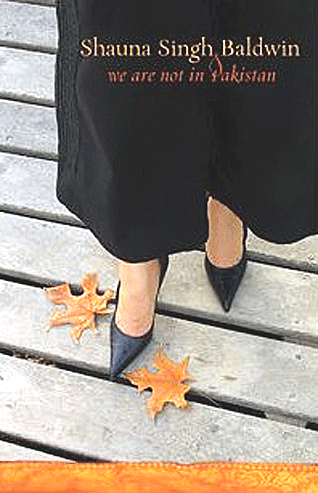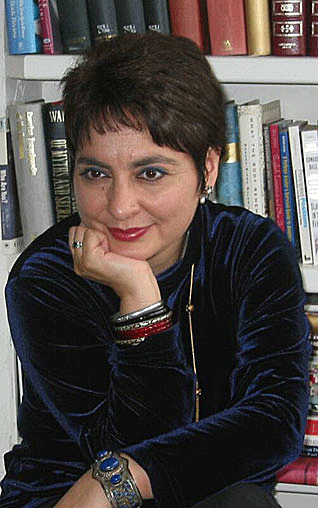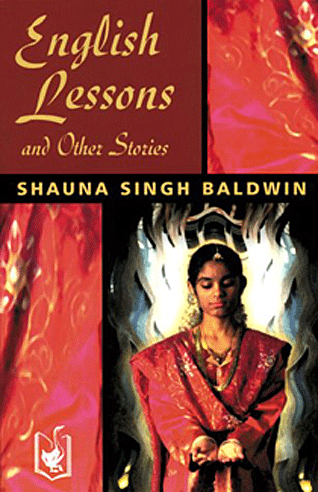Books
We Are Not In Pakistan
A Book Review by CHRISTINA LEADLAY
WE ARE NOT IN PAKISTAN, by Shauna Singh Baldwin. Goose Lane Editions, Canada, 2007. ISBN-13: 978-0-86492-488-9. 275 pages. Price: $22.95.
Shauna Singh doesn't mind multiculturalism, but has no time for the idea of a cultural melting pot.
The Montreal, Canada-born, Milwaukee, U.S.A.-based writer says that multiculturalism is good, but that it is time it evolved into something new.
"We need to move past multiculturalism to hybridism", she says by phone from Toronto. "I think that twenty years of multiculturalism has been a necessary condition for Canadians to head in the direction of hybridity. Hybridity is simply understanding and enjoying everybody's culture and making it your own as well", declares Ms. Singh. "It doesn't have to be that we all fit in our little ghettos, and it doesn't have to be this god-awful melting pot idea that I certainly do not subscribe to, but there is a third way".
It's this urge to make people more understanding of cultures different from their own that lies at the heart of Ms. Singh's new collection of short stories, We are Not in Pakistan. Each of the ten short works of fiction follows a variety of characters - from a Caucasian Canadian lap-dancer to a Jewish Ukrainian mother, to a Sikh professor in California, to a dog named Fletcher - in an attempt to illustrate what hybridity might entail.
"Hybridity entails, actually, trying to understand, trying to walk in the shoes of someone else, and how do you do that?" asks Ms. Singh. "Fiction is the only thing that really helps us to enter into somebody else's point of view".
Ms. Singh has taken almost ten years to write these ten tales, each very separate in time, location, characters and events, but all united by certain themes, such as questions about our relationship with art, and difficulties dealing with each other in a globalized world. Every story concerns someone who has moved from what they have been familiar with before, to coming to terms with their new situation.
There is Olena, who flees the nuclear disaster at Chernobyl for a new life in Chicago; Costa Rican worker Wilson Gonzales, who climbs out of grief to a life of happiness; working-class Tania who moves from Windsor, Ontario, to a life as a rich doctor's wife in Toronto; and Miriam, who, decades later, still compares her American life to her childhood in Pakistan. Many of the stories deal with a sense of loss, but also of new experiences.
Provocative Title
It's the tale of Miriam and her teenage granddaughter Kathleen that Ms. Singh has chosen to name her collection after. She says it's a provocative title that she wants readers to keep in mind as they read the compendium.
"Depending on where you are in the world when you read this, you can decide if we are or we are not in Pakistan, if the title is true to the stories", she says.
"It's provocative in the sense that I want us to think about that: Are we in Pakistan? Maybe we are all in Pakistan and we don't know it", continues Ms. Singh.
"Pakistan, at this moment in time, represents many things to many people. Everybody's image of Pakistan is so different". She believes the South Asian nation has entered more into the public consciousness compared to ten years ago, when it was considered an exotic, off-the-map place.
"Now, of course, everybody's heard of Pakistan, but there are so many different ways of thinking about it", states the author, who herself has traveled to the country. "To the people who are in Pakistan, it is a whole different idea, and then to the people who hear about it, there are some who think it's a client state of the U.S., there are some who think it's a place so way off and remote and different from North America - but is it? That's the question".
As someone who has lived and worked around the world, Ms. Singh feels foreign cities are places of "joy and discovery", but that newcomers, particularly to the United States, have to deal with being marginalized by the rest of the population, which, she believes, is "still in the dark ages before multiculturalism".
Concern with Civil Liberties
The themes of the post-9/11 climate in America and the Department of Homeland Security are recurring throughout the short stories.
"As soon as you start talking about civil liberties, you start talking about the people who are affected by them. The characters, naturally, are concerned about these things, because they are marginalized by the determined suspicion and the attitude of racial paranoia that surrounds us in the U.S.", she says.
Ms. Singh portrays how both immigrant and native-born characters cope with these issues. India-born Sikh Dr. Karan Singh deals with his Californian neighbours breaking into his house and vandalizing his car, while Second World War veteran Larry Riley is hyper-conscious of everyone's race and background, with terrorism issues not far from his mind.
"If you are of European origin, you certainly don't feel that ... whereas when you are not of European origin, you feel that everything is being done against you. As it's not a very comfortable place to be, I think the choice of characters just naturally led to commentary on that subject.
"[Larry is] as safe as he can possibly be", Ms. Singh declares with a laugh. "It's a strange thing, because it permeates life south of the border, it really does".
Ms. Singh says it's people like her character Larry Riley who she wants to read We are Not in Pakistan, but knows they will never be her audience, due to their close-minded ways.
"I doubt whether a lot of racist people are going to read my book. I really do. A lot of people have given up reading fiction who really need to do it, and partly it's because people who don't read fiction are not very anxious to have somebody else's point of view in their mind", she states. But Ms. Singh thinks if such a person were to read her book, she would hope she could help break down their stereotypes of immigrants and displaced people.
"I would like there to be a little bit more understanding of what an immigrant goes through. There is so much that we could learn from people who are not from the same culture", she says. "To ask that people walk away from more than four thousand years of history to come to North America is a big sacrifice to ask and it's being asked more and more as people start to question multiculturalism, even in Canada.
"To me, the act of questioning is really ridiculous, given the globalized world we find ourselves in. We need more understanding, not less".
[Courtesy: Embassy]
Conversation about this article
1: Dr. Teja Singh (Edmonton, Canada), October 12, 2007, 11:44 PM.
Each culture, like every human being, is unique and has something good to offer. It also carries some baggage along with it when we immigrate to another country. Get rid of the dead weight, and willingly share the many good things in it.





